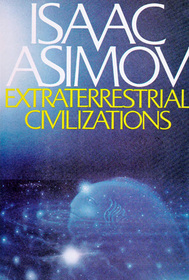The author takes the time to explain quite a lot of factual information about the solar system, stars, etc. to logically determine of there are extraterrestrial civilizations (with what we know). He surely must have "dumbed down" the info for the average reader or perhaps even the high school/college. For this, I am grateful, though I still had to really concentrate while reading to absorb all these large numbers and facts. It's not an easy read. Still, I found it very interesting.
He comes to the conclusion that there are many planets (under 500,000) that could hold intelligent civilizations but they are simply too far away. He dismisses the idea that we have been visited by extraterrestrials and believes UFO's to be hoaxes or simply mistakes.
He suggests such things as building space stations (book was published in 1979), mining the Moon and establishing colonies on Mars. This would allow us to gradually explore our own solar system, possibly even colonizing the asteroid belts. He discussed the speed of light as a limit for space travel and possibly using black holes, time dilatation, etc. to get around it. This part was really fun to read as it reminded me of Star Trek, which I always enjoyed. Who wouldn't want a replicator? I really like the book and am glad to have read it.
He comes to the conclusion that there are many planets (under 500,000) that could hold intelligent civilizations but they are simply too far away. He dismisses the idea that we have been visited by extraterrestrials and believes UFO's to be hoaxes or simply mistakes.
He suggests such things as building space stations (book was published in 1979), mining the Moon and establishing colonies on Mars. This would allow us to gradually explore our own solar system, possibly even colonizing the asteroid belts. He discussed the speed of light as a limit for space travel and possibly using black holes, time dilatation, etc. to get around it. This part was really fun to read as it reminded me of Star Trek, which I always enjoyed. Who wouldn't want a replicator? I really like the book and am glad to have read it.
First published in 1979, Doctor Asimov gave us the fundamental numbers upon which to estimate the presence of technological civilization in our Galaxy; his argument still today appears unimpeachable.




